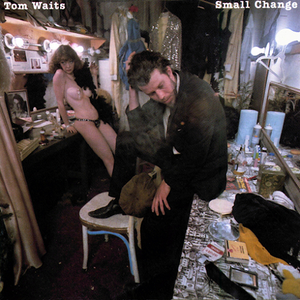Published on Feb 11, 2000
Tom Waits is a unique individual, and probably the best way to
describe him and his music is best defined in
ROLLING STONE Encyclopedia of Rock & Roll:
Singer/songwriter Tom Waits is a one-man Beatnik
revival. He generally appears with a cap pulled over his brow, a
cigarette dangling from his stubbled face, talksinging and/or
mumbling jive in a cancerous growl to the accompanient of cool
saxophone jazz; he also writes romantic ballads, which have been
covered by the Eagles, Rickie Lee Jones, and others.
Fireside, Simon & Schuster, 1995
“Cool Saxophone Jazz” as well as “Lounge Act Piano Jazz” best
describes
Small Change, his 1976 release, that is quite impressive,
and is recommended for the standard jazz lover.
“Tom Traubert’s Blues (Four Sheets To The Wind In Copenhagen)”
is a heartfelt song to start out the album. Featuring Waits on the
piano, with his unique voice, this song has the lounge act sound,
where “that piano player” is pouring his heart out, both vocally
and instrumentally. “Step Right Up” has the New Orleans jazz style,
with Waits’ vocal style as the great Louis Armstrong.
What makes this album stands out so well are the songs like the
opening track, “Tom Traubert’s Blues.” Imagine a smoke-filled
saloon, where the music is heard from a small corner of the bar.
And there, is a hard working piano player with a very unique voice,
that you just can’t help but listen to his beautiful playing and
his distinctive vocal style. Songs such as “Jitterbug Boy (Sharing
A Curbstone With Chuck E. Weiss, Robert Marchese, Paul Body And The
Mug And Artie),” “I Wish I Was In New Orleans (In The Ninth Ward),”
“The Piano Has Been Drinking (Not Me) (An Evening With Pete King)”
and “Invitation To The Blues” displays the heart and soul of Tom
Waits lounge-style performances that can easily get the repeat
button activated on any of these tracks to enjoy again and
again.
“Pasties And A G-String (At The Two O’Clock Club)” is another
upbeat Louis Armstrong-jazz tinged song. The return of the
lounge-act piano playing returns again with “Bad Liver And A Broken
Heart (In Lowell)”. The jazz-inspired “The One That Got Away” is a
talk-driven common jazz song, focusing on two main instruments in
jazz: The stand-up bass, and saxophone. The saxophone-inspired
talking song, “Small Change (Got Rained On With His Own .38)” is
definitely jazz, with only the saxophone and Waits’ vocals. The
album closes with “I Can’t Wait To Get Off Work (And See My Baby On
Montgomery Avenue)”, another lounge-act piano-driven
composition.
Again, the songs that features just the soft-jazz piano and
Waits’ vocals truly stands out on this album. It’s contemporary
jazz, that can easily be compared to Humphrey Bogart’s Casablanca,
yet the piano player singer has a distinctive voice, that of a
Louis Armstrong. Waits’ voice is rough, but his vocal style
surprisingly blends extremely well with the soft-jazz style. For
the diehard jazz fan, this album is a must. And, this album will
have you running to the record stores for more of Waits’ albums.
His early albums feature this kind of sound, although his later
albums he experimented with electric guitar and experimental rock
work. But Tom Waits is best known for the music presented here on
Small Change. It’s an album that will have the repeat button
on for the entire album, especially the soft, piano-and-vocals
lounge act compositions.
